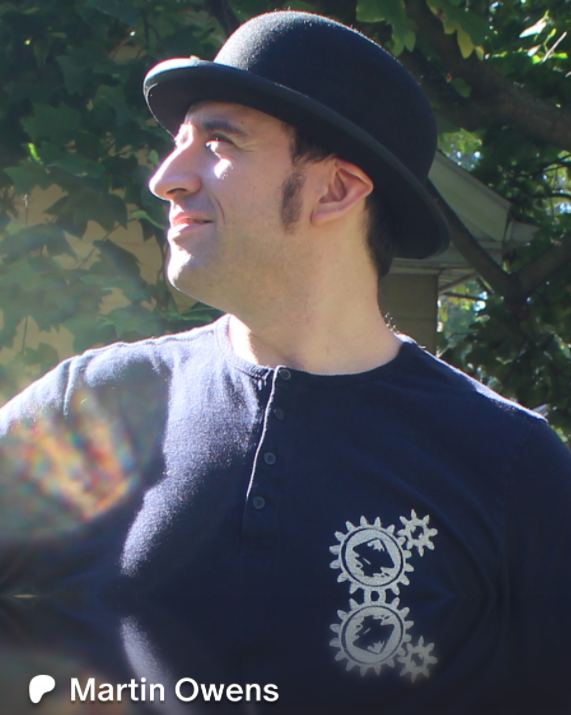Martin Owens has been an active contributor to the FLOSS community for decades and is a prominent developer of the Inkscape codebase. He also has his own channel on our Peertube platform.
To celebrate the first anniversary of our platform, we decided to use this opportunity to ask Martin a few questions about his views on Peertube, Inkscape, and the future of free software.
You have said that your entry into using Linux was because of political reasons. What came first for you, the interest in programming or in politics?
I was brought up to be a working class socialist. Politics, especially labour rights, are very near to me. But I also started programming when I was very young; attending college at 12 in order to get access to computers. So my views and skills grew together. Though my orientation towards Free Software came when I was about 16 doing perl websites for a local company.
What made you decide to specialize in the development of Inkscape?
I wanted to contribute something meaningful. I was seeing that my work on libraries and websites wasn’t doing anything for anyone and I wanted to understand why. I did some work in the Ubuntu community, but it was Inkscape that helped me grow into understanding how the service of other people is key to how development can be orientated.
What do you think is the best thing about working with free software?
Working with so many different people around the world. Talking on video chats from people on the other side of the planet is an awesome feeling.
After the first brief Peertube stop on another platform with the hand-picked 30ish videos that was hard to manage it is now a year since your entire video catalogue became available on our PeerTube platform. While viewing figures are not necessarily comparable to centralized platforms, we do know that PeerTube’s viewing figures are on the low side. What we can also clearly see is that the most traffic and views are generated when videos are linked to directly on the platform, at least by a factor of four, compared to find your way to the channel by follow-up posts etc.
So what would you say is the advantage of having a channel on a federated platform over a centralized one?
Mostly the tracking. I don’t want my viewers written up for watching this video or that video. But there’s plenty of other things that I have a hope for growing into in the future.
You have had a long career in the FLOSS world. Have you seen any change in the public’s attitude towards FLOSS since you started 25(+) years ago?
There is more recognition from the public. And that comes with words being twisted as in the case of open-washing VC funded AI companies. But we’ve also a lot to do in order to tie together the malpractice of power hungry IT firms with the lack of control, choice and even progress the normal person sees day to day. Governments and small firms are still in the practice of going with the flow for many technologies which are too complex to understand and this makes them easy to prey on. But they also know this and I’ve seen people move to open source by default as a reasonable request from their IT vendors. Though not enough.
We very much enjoyed the “Let Software Freedom Ring!” video. What do you think the future of free software looks like? And will there be any droplets of wrath accompanying the call for solidarity or will there be more like our joint mission to cover the blank spots and rough patches?
Thanks! If you mean, will or has there been any backlash? Not really. The mildest critique is a couple of people restating their own apolitical ”money first” or ”feature first” perspectives. I’m not sure who they’re trying to convince, me or themselves at this point. But for the actual politics, not much, even the core artist community on Youtube is broadly understanding.
Over the years since the hype of semantic web, we tried to emphasize and keep the good parts of the concept of the semantic desktop top of head wherever GUIs were spotted. In relation to that how could Library Computer Access and Retrieval System (LCARS) potentially contribute to a less patchy road ahead either in general or for Inkscape specifically?
I like Star Trek and I thought Michelle Barret was a really good computer voice. Neutral with a sense of both statement authority, but not in any way bullying or arrogant. Which for software like the LCARS is a smart bit of design. I hope that Inkscape can likewise learn from SciFi like Star Trek when it experiments with user interfaces or ways of problems solving. 😅️
Thanks, Martin, it is a pleasure having you with us.
Go directly to the 250+ videos in Martin’s channel or browse the curated playlists
En översättning till svenska kommer inom kort.

